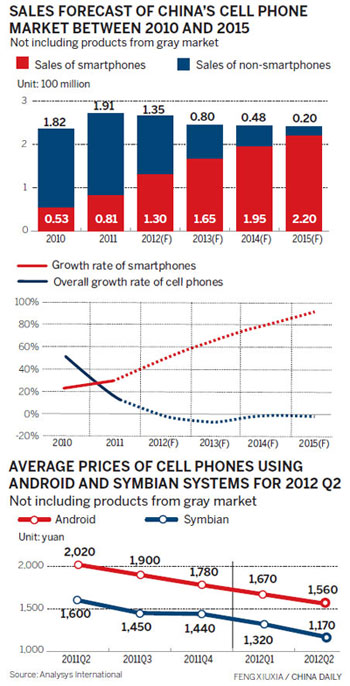Smartphone dependency is at least a growing phenomenon - if not a problem. He Wei reports in Shanghai.
A new game youth play out at dinners reveals a social reality - the first one to check their smartphone pays the bill. While the concept of this fad is all in fun, it hints at a serious obsession with powerful pocket-sized computing devices. People reach for them first thing in the morning and last thing at night. They compulsively check their mobiles when commuting to work, during pre-dinner drinks, in the middle of the night and even when using the bathroom.
 |
|
Passengers play with their cell phones on the subway in Shanghai. Dependency on smartphones is a growing phenomenon. Gao Erqiang / China Daily |
A recent survey by the major domestic Internet portal Tencent suggests it really is hard for people to keep their hands off these handheld devices.
The poll found 60 percent of respondents check their phones in bed, and 16 percent play with them for more than an hour before going to sleep.
But only 34 percent want to use their phones less, believing that overuse could cause physical illness or even serious mental disorders.
A major draw for many users is China's Twitter-like weibo micro blogs, which have become an integral part of life for most youth. These social networks, along with other smartphone applications, enable them to keep up with their jobs, teams and friends in real time.
Being hyper-connected is a point of pride for many aspiring white-collar workers. But, for many, it goes beyond boosting their sense of self-worth to being a necessity for delivering for big clients.
Junior investment banker Chen Shuang says she can't afford to not check her BlackBerry every hour.
"Everybody at work does it," the 27-year-old says.
"I panic if it's not in my sight. What if my clients need me? Or what if I miss breaking industry news that might affect my ongoing transactions? Or what if there is a recall of a report that requires urgent changes?"
Chen believes the reliance on smartphones is a good thing. She says that having e-mails immediately sent to colleagues' smartphones generates peer pressure to remain committed to projects.
Jian Fang, general manager of mobile advertisements at digital advertising company hdtMedia, says that once a technological leap revolutionizes interaction paradigms, it reinforces social class distinctions. It also exaggerates some of the most detestable contemporary trends.
As white-collar workers find work piling up at ever-greater rates, the smartphone era has made it more difficult than ever to draw distinctions between work and life outside of work, Jian says. People are constantly dealing with last-minute changes made possible by the proliferation of handheld digital devices.
The Economist magazine quotes branding guru Martin Lindstrom as saying research has found that a vibrating mobile phone is the sound that has the third most powerful effect on people, after the Intel chime and a giggling baby.
Guan Herong, social media director of online advertisement-tracker AdMaster, says smartphones can enhance work efficiency - or distract workers. And they are often the primary cause of procrastination.
"The bombardment of information smartphones causes people to prune e-mails of important content, and sacrifice time and energy that would otherwise be spent on important tasks," he says.
AdMaster tracks a micro blog group on Sina Weibo under the avatar "Fresh Salarymen" that comprises thousands of white-collar workers, all of whom are younger than 30.

Guan explains the five most popular topics on the group aren't work related but, rather, deal with romance, jokes and price discounts.
The Chartered Society of Physiotherapy in the United Kingdom reports that these devices prolong the working hours of "screen slaves" in ways they aren't even consciously aware of. Working after leaving the office on their smartphones or tablets causes a health risk, the organization says.
It surveyed 2,010 office workers and found that nearly two-thirds continued working outside office hours, adding an average of two extra hours of screen time to their workdays.
Jian believes smartphone addiction's root cause is an anxiety about the unknown future - and an ability to predict and control it. People believe checking e-mails and social networks is a responsible way to seek answers to uncertainty.
She says this phenomenon is created by an impulse to alter the external world and can be explained by the philosophy of German philosopher Georg Wilhelm Friedrich Hegel. Hegel likens it to a boy who throws stones into a river and marvels at the ripples upon realizing they are the result of his individual actions.
"So, when you post a blog, you really want to see how your friends respond to it," she says.
"The number of comments and forwards indicate a level of influence you exert on others."
Psychologists have coined a term for the fear of losing a cell phone. Nomophobia - a portmanteau of "no mobile phobia"- is on the rise around the world, according to a survey by San Francisco-based mobile security company Lookout.
About 94 percent of respondents say they live in a perpetual state of fear that they might lose their cell phones, with 73 percent likening the feeling of misplacing a phone to pure panic, while 14 percent report feeling "desperate".
The role mobile platforms are playing in identity construction and projection, and social interaction is creating a very strong urge to spend unreasonable amounts of time on one's cell phone, says Kevin Gentle, digital strategy consultant of Labbrand Enterprise Management Consulting in Shanghai.
But there are two particular reasons the gadgets have gained special popularity in China, Gentle says. One is that the country is going through a phenomenon called "leapfrogging", in which smartphones remain the main, if not the only, point of Internet access for many people - especially for those from lower income groups and those living outside big cities.
Also, China is creating such advanced mobile applications as Weixin, known as WeChat in the West, which enable mobile devices to play a greater role in defining identity and communication with social circles.
The question then becomes whether there is - or even should be - a solution to smartphone dependency.
Guan says it's different from regular Internet or online gaming addictions, which are generated by content. Mobile device dependency instead arises from insecurity about real world interactions and serves as a psychological shelter.
Gentle says the best time to overcome this dependency is before it has fully formed as habitual behavior.
"Perhaps for younger users, parents should adapt to the new environment their kids and teens live in and establish clear rules that prevent them from being overly reliant on digital platforms in their social lives and to define their identities," Gentle says.
Harvard Business School professor Leslie Perlow says that adults are better off using a collective, rather than individual, approach to weaning themselves.
In her latest book, Sleeping with Your Smartphone, Perlow tells the story of how workaholics at Boston Consulting Group manage to regain some degree of freedom by swearing off their cell phones together. The company introduced rules about when people were expected to be offline and encouraged them to work together to make this possible.
When clerks receive pressing demands from clients, employees are encouraged to find colleagues to cover for them. In this way, the group figured out how to more effectively divide up work.
Something about these pauses was making the company's consulting more efficient, team-oriented and creative.
And they even get better assessments from their superiors.
Contact the writer at hewei@chinadaily.com.cn.
